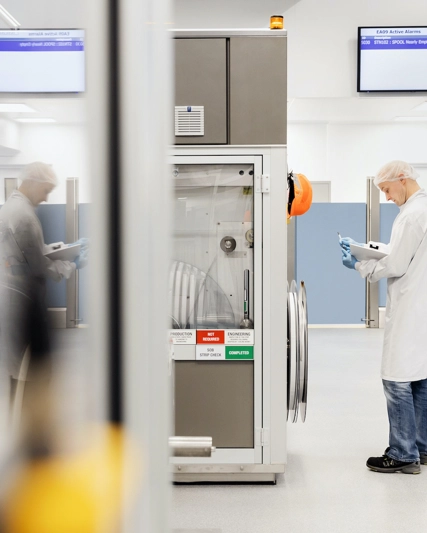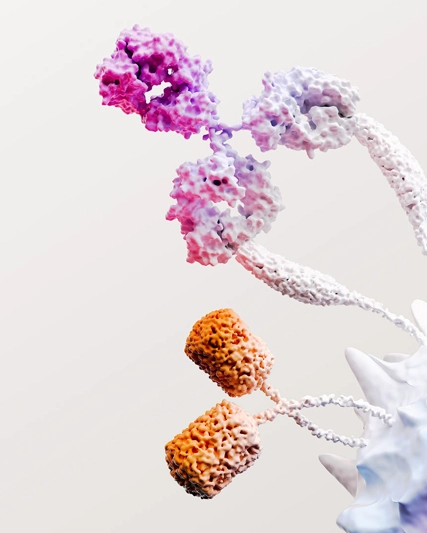ViiV Healthcare presents positive proof-of-concept findings for N6LS, an investigational, broadly neutralising antibody (bNAb) offering a potential new approach for the treatment of HIV
Issued: London UK
For media and investors only
Data from the BANNER study show antiviral efficacy, safety, and tolerability of N6LS, supporting its continued study in phase IIb
ViiV Healthcare, the global specialist HIV company majority owned by GSK, with Pfizer and Shionogi as shareholders, today announced positive findings from its phase IIa proof-of-concept study of N6LS (VH3810109), a novel, investigational, broadly neutralising antibody (bNAb) that is being studied at two dosing levels – a high dose and ten-fold lower dose (40 mg/kg and ~4 mg/kg (280 mg), respectively), in adults living with HIV. The study showed that a single infusion of N6LS demonstrated strong antiviral efficacy at both doses while also being well-tolerated by study participants.[1] The results were presented today at the 30th HIV Glasgow Conference being held in Glasgow, Scotland from 23 – 26 October.
Broadly neutralising antibodies (bNAbs) are antibodies that can recognise and block the entry of different strains of HIV into healthy cells. N6LS is a bNAb that works by binding to a specific site (gp120) on the surface of HIV that prevents its entry into immune system cells (CD4+ T-cells). By blocking HIV’s entry into human CD4+ cells, the virus is unable to replicate, and the HIV transmission process may be prevented.[2]
Kimberly Smith, M.D., MPH, Head of Research & Development at ViiV Healthcare, said: “Because of the rapidly changing nature of HIV and its potential to develop resistance to certain treatments, the HIV community continues to be in need of medicines with unique mechanisms of action like bNAbs, which may open up a completely new approach to treating HIV. ViiV Healthcare is proud to be at the forefront in advancing this innovative research. These positive proof-of-concept findings show N6LS’s potential as a first-in-class treatment option and underscore our commitment to developing ground-breaking medicines that can help change the way HIV is treated.”
The phase IIa BANNER study was a randomised, open-label, two-part, multicentre study to evaluate the safety, pharmacokinetics, and antiviral activity of N6LS among 14 treatment-naïve adults living with HIV. N6LS was evaluated as monotherapy with participants receiving a single intravenous (IV) infusion of either the 40 mg/kg dose or ~4 mg/kg (280 mg) dose, followed by 48 weeks of standard-of-care antiretroviral therapy.
At the conclusion of the monotherapy period, virologic response to the bNAb was seen in 13 of the 14 participants, with a median viral count reduction from baseline of 1.72 (0.60-2.60) and 1.18 (0.30-2.18) log10 copies/mL for the 40 mg/kg and ~4 mg/kg treatment arms, respectively.[2] When administered at 40 mg/kg, N6LS led to a robust decline in viral load consistent with antiviral activity reported for other bNAbs. The viral load decline and duration of response observed in the 10-fold-lower dose of 4 mg/kg exceeded efficacy reported by other bNAbs at similarly low doses.[2]
Treatment with a single IV infusion of N6LS was well-tolerated, with few drug-related adverse events (AEs) and no AEs leading to discontinuation. AEs were reported by nine participants (56%), with all AEs being mild or moderate in nature. Six of the AEs were considered drug-related, and included reports of abdominal pain (two), gastrointestinal pain, pruritis, asthenia, and myalgia.
Pedro Cahn, M.D., Scientific Director, Fundación Huésped, Professor of Infectious Diseases, Buenos Aires University Medical School, and Investigator for the Banner Study, said: “The positive proof-of-concept results presented today show that N6LS was well-tolerated by participants and demonstrated strong antiviral efficacy - even at a low dose - warranting its further study as a potential treatment option for people living with HIV. As we investigate bNAbs as an entirely new approach to HIV science, it’s particularly exciting to see that this bNAb exceeded the efficacy reported by other bNAbs at certain low-dosing levels. We look forward to studying this promising medicine further.”
ViiV Healthcare expects to begin a phase IIb study of N6LS in combination with other anti-retrovirals in 2023 to further evaluate the efficacy, safety, and tolerability of this bNAb. Future areas of study include its potential utility as a long-acting therapeutic option and in approaches for an HIV remission and cure.
About ViiV Healthcare
ViiV Healthcare is a global specialist HIV company established in November 2009 by GlaxoSmithKline (LSE: GSK) and Pfizer (NYSE: PFE) dedicated to delivering advances in treatment and care for people living with HIV and for people who are at risk of becoming infected with HIV. Shionogi became a ViiV Healthcare shareholder in October 2012. ViiV Healthcare's aim is to take a deeper and broader interest in HIV/AIDS than any company has done before and take a new approach to deliver effective and innovative medicines for HIV treatment and prevention, as well as support communities affected by HIV. For more information on the company, its management, portfolio, pipeline, and commitment, please visit www.viivhealthcare.com.
About GSK
GSK is a global biopharma company with a purpose to unite science, technology, and talent to get ahead of disease together. Find out more at gsk.com/company.
Cautionary statement regarding forward-looking statements
GSK cautions investors that any forward-looking statements or projections made by GSK, including those made in this announcement, are subject to risks and uncertainties that may cause actual results to differ materially from those projected. Such factors include, but are not limited to, those described in the Company's Annual Report on Form 20-F for 2021, GSK’s Q2 Results for 2022 and any impacts of the COVID-19 pandemic.
References
[1] Kumar R, Qureshi H, Deshpande S, Bhattacharya J. Broadly neutralizing antibodies in HIV-1 treatment and prevention. Ther Adv Vaccines Immunother. 2018;6(4):61–68.
[2] Leone, A. Ferro, C.P. Rolle et. al. VH3810109 (N6LS) Reduces Viremia Across a Range of Doses in ART-Naive Adults Living with HIV: Proof of Concept Achieved in the Phase IIa BANNER (207959, NCT04871113) Study. Presented at HIV Glasgow.


